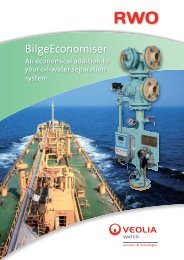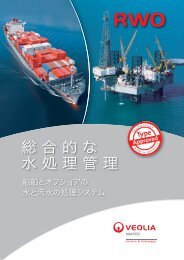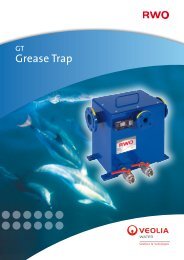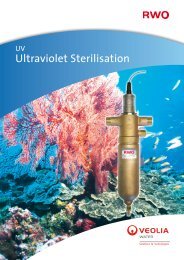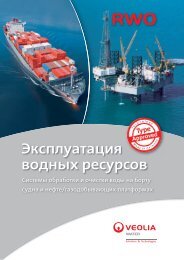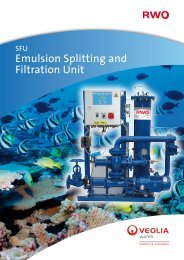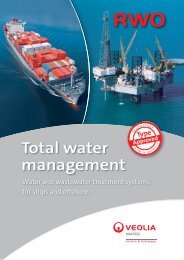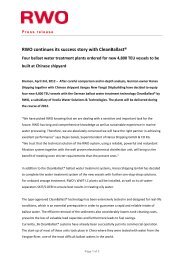the IHS Ballast Water Guide - RWO Marine Water Technology
the IHS Ballast Water Guide - RWO Marine Water Technology
the IHS Ballast Water Guide - RWO Marine Water Technology
Create successful ePaper yourself
Turn your PDF publications into a flip-book with our unique Google optimized e-Paper software.
Sponsored by <strong>IHS</strong> Fairplay Solutions <strong>Guide</strong> to <strong>Ballast</strong> <strong>Water</strong> Treatment Systems<br />
Sampling<br />
and port state control<br />
<strong>Ballast</strong> water sampling and analysis<br />
procedures and <strong>the</strong> implementation<br />
protocol for port state control (PSC) were<br />
re-examined and planned to be fi nalised<br />
at MEPC 63, which was held from 27<br />
February to 2 March. Two sets of draft<br />
guidance were submitted to <strong>the</strong> IMO<br />
Sub-Committee on Bulk Liquids and<br />
Gases (BLG).<br />
One draft covered guidance on sampling and<br />
<strong>the</strong> o<strong>the</strong>r off ered advice on PSC issues. The<br />
result was a split between a group including<br />
<strong>the</strong> large fl ag states – including Panama and <strong>the</strong><br />
Bahamas – and an EU-led group.<br />
The ICS has highlighted <strong>the</strong> chaotic state of<br />
ballast water treatment rules after <strong>the</strong> IMO<br />
BLG Sub-Committee agreed to alterations in<br />
<strong>the</strong> draft ballast water sampling and analysis<br />
guidelines that will be used by PSC.<br />
Effect of BWT on coatings<br />
This might be damaging to shipowners<br />
were it to be adopted by IMO contrary to what<br />
had previously been agreed by <strong>the</strong> MEPC.<br />
Accordingly, <strong>the</strong> ICS issued a strong statement<br />
at <strong>the</strong> end of <strong>the</strong> BLG meeting in January<br />
about <strong>the</strong> direction that had been taken. Now,<br />
with <strong>the</strong> support of many fl ag states, <strong>the</strong> draft<br />
guidelines will be reconsidered.<br />
This means, however, that <strong>the</strong> guidelines<br />
associated with sampling and analysis will<br />
not be approved until 2013 at <strong>the</strong> earliest,<br />
which is expected to delay <strong>the</strong> additional<br />
ratifi cations needed to bring <strong>the</strong> IMO<br />
<strong>Ballast</strong> <strong>Water</strong> Management Convention<br />
into force. The delay creates o<strong>the</strong>r problems<br />
for shipowners, because of <strong>the</strong> fi xed dates<br />
by which existing ships have to install <strong>the</strong><br />
potentially expensive treatment equipment<br />
required by <strong>the</strong> convention.<br />
A potential consequence of ballast water treatment – at least for those systems that make use of an<br />
active substance – is <strong>the</strong> potential for damage to be caused to <strong>the</strong> wider ballast system. Coatings suppliers<br />
have expressed concern about <strong>the</strong> effect of treated water on paint and <strong>the</strong> risk of corrosion of ballast<br />
water tanks.<br />
The confl ict has arisen because <strong>the</strong> paint, as <strong>the</strong> last layer on, is traditionally considered accountable<br />
for <strong>the</strong> effect on <strong>the</strong> tank and <strong>the</strong> water it holds. Coating manufacturers argue that BWT systems<br />
appeared after coatings were developed, so <strong>the</strong> onus is on <strong>the</strong> system-makers to test <strong>the</strong>ir products<br />
against existing coatings. With no offi cial regulatory decision, <strong>the</strong> dispute rumbles on, but it is something<br />
that owners selecting ei<strong>the</strong>r a tank coating or a ballast water treatment system should consider before<br />
coming to a fi nal decision.<br />
One of <strong>the</strong> main elements of a ballast system is its piping. Seawater is highly corrosive and pipes often<br />
need repair or replacement. Some new suppliers are promoting <strong>the</strong> advantages of composites over steel<br />
and <strong>the</strong>re do appear to be more benefi ts than downsides to <strong>the</strong> idea. Claimed advantages include lightness,<br />
absence of corrosion and <strong>the</strong>ir potential for use in repairing damage to existing steel systems.<br />
© <strong>IHS</strong> Global Limited 2012 43<br />
042_043_BW1204.indd 43 21/03/2012 18:49:56



